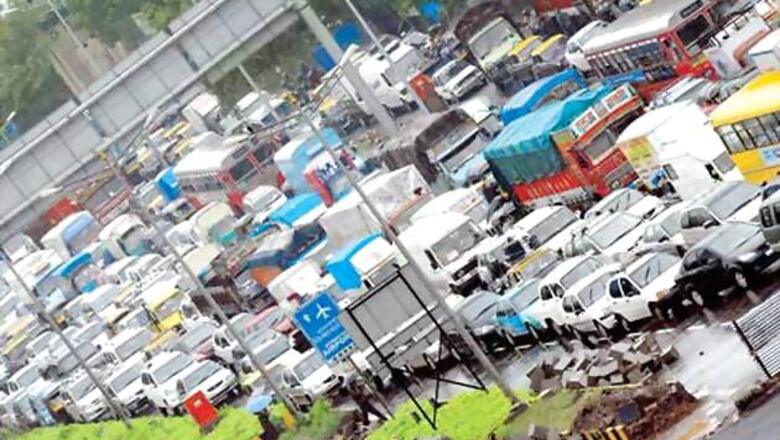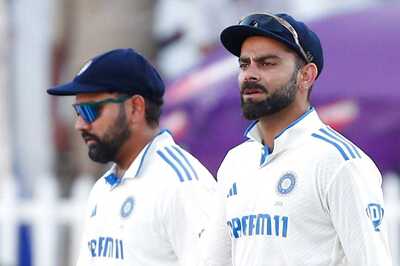
views
Mumbai: Traffic congestion, ever-increasing pollution and lack of parking space-Mumbai’s traffic problems are endless. From widening roads to encouraging people to use public transport, experts and analysts have numerous suggestions to improve the city’s traffic situation. A media report said that in Guangzhou, one of the largest cities in China, the government has put a cap on the number of vehicles to be registered in a year. Limiting the number of new cars on the streets was done to ease traffic jams and cut pollution levels in the city.
Yet, experts here feel a similar model is not feasible in a megacity like Mumbai. Deepak Kapadia, Road Safety Committee, Rotary Club of Bombay, said, “Many believe that number of cars owned by a particular family should be restricted. This will not help in reducing the number cars on roads. For example-— some people might have seven cars, but all the seven cars are not on the roads at the same time. So restricting the number of cars per family is not a solution.”
Kapadia further explained, “The main problem is that of limited road space. Unless road space is increased, traffic problems will not ease. Along with the width of the road, lane driving should be made compulsory. Public transport systems should also be improved so that people are encouraged to use trains and BEST buses.”
Transport
Nitin Dossa, Executive Chairman of Western India Automobile Association (WIAA) believes that the Guangzhou model cannot be replicated in a city like Mumbai. “Guangzhou is a business district. There are pockets, which are exclusively for commercial purposes, and areas, which are residential. So the traffic scenario in such a city is different. In Mumbai, this is not the case.
Commercial and residential areas are merged together in most parts of the city. Hence, traffic problems here are entirely different. We need to take a holistic approach of the situation. But the beginning has to be made by upgrading the public transport system in the city, so that people use public transport, at least for shorter distances,” said Dossa.
Many believe that the city’s traffic problems are interlinked. “Hence, simultaneously a number of steps have to be taken to arrive at a solution,” said Ashok Datar, traffic analyst.
Datar explained, “Limiting the number of licenses was first of all introduced in Singapore. This was later replicated in Beijing too. We badly need to restrain usage of cars, but there cannot be a one-stop solution to the problem. I feel that traffic related problems in Mumbai are quite complex. First and foremost, providing unlimited parking space for cars will not ease the city's traffic problems. Luring buyers with cheaper parking space will add to the city's traffic woes. Parking should be restricted on basis of road space available.”
He added, “At the same time, footpaths for pedestrians should be made wider. Even a short distance ride on a bus or a train should be made pleasant for commuters. All these measures should be taken simultaneously. After this, the government may try to restrict the number of vehicles by putting a cap on licenses, etc. Only then will the traffic situation in the city improve.”
Dr P S Pasricha, traffic expert shared his take on the quota system in Guangzhou. “Singapore was the first country to introduce this system almost 12 years ago. The model was highly successful over there. But one has to understand that there are a few prerequisites that make this model work. First, there should be a very efficient, comfortable and excellent public transport facility available so that people are tempted to use them.”
He added, “Good pavements and footpaths where people would enjoy walking, have to be there. In Mumbai, even if people want to walk, due to paucity of space, they can’t. Better walking routes can ease traffic problems to a great extent. Most big cities all over the world have an efficient metro system in place. We need something like this in Mumbai too so that private cars on the streets are reduced. Hence a composite effort is required in this regard.
“Also, one must understand that Mumbai as a city is unique and its problems are unique too. Hence, copying a model that has been successful elsewhere may not work here. Once has to learn from other countries, but when it comes to implementation, we need to customise it to suit the need of the city and people living here,” he said.
Quota
The municipal government in Guangzhou, a city in China, has limited the number of new cars on the streets to ease traffic jams and cut pollution levels. A new car-purchasing scheme was introduced nearly a month ago. According to the rules, only 120,000 new cars will be allowed to register over a one-year trial period, in the city of Guangzhou. This means 10,000 cars a month will be allowed registration. Earlier, Beijing in China had started capping new car ownership at 20,000 a month to ease the traffic situation.



















Comments
0 comment